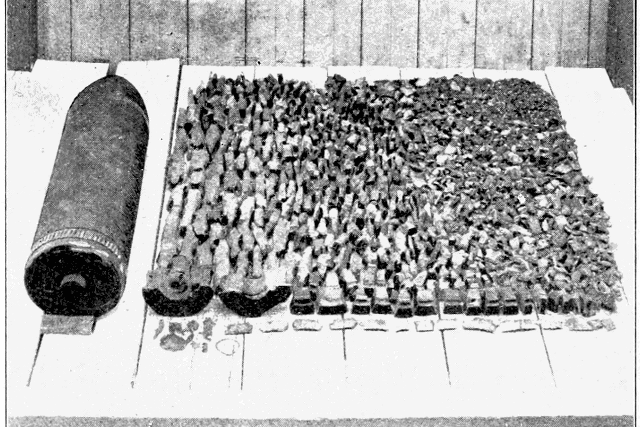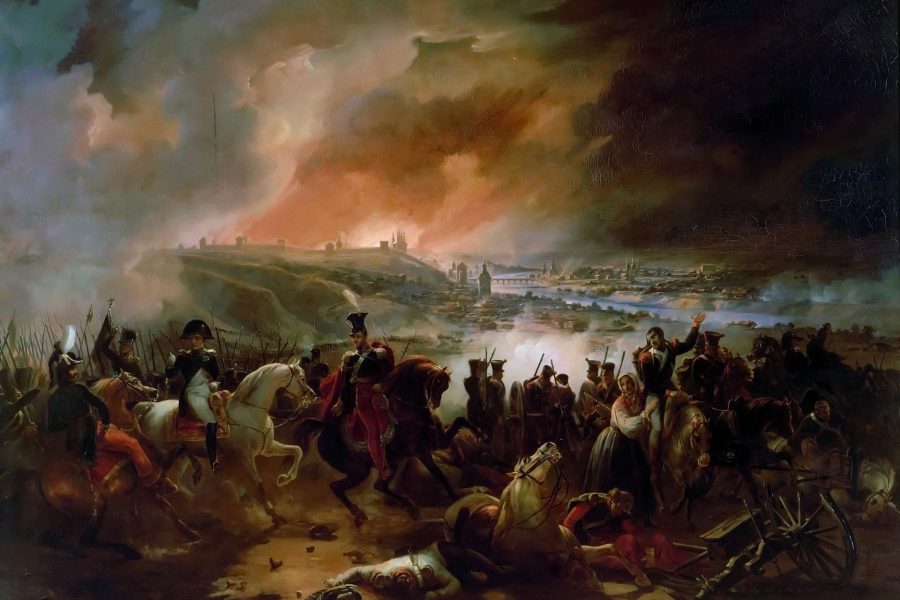Eponym - is a word denoting an object or action named in honor a person, usually the person who first created the object or action in question. The English language is filled with eponyms, many of which are obvious: Fahrenheit, Marxism, even America. But there are many others that are not so obvious, even though we use them on a common basis. Here are 10 of them…
10. Nachos

One day in 1943, a maitre d' named Ignacio Anaya Garcia greeted a group of soldiers' wives at the restaurant where he worked, Club Victoria near the Texas-Mexico border. The women had just visited their husbands at a nearby U.S. Army base and stopped by the restaurant for a quick bite. But there was just one problem: the chef was missing.
Anya had to improvise. He went into the kitchen and cooked something up right there. He took some tortilla chips, melted some Wisconsin cheese on them, and added some sliced jalapeno peppers.
The ladies loved it. When asked what the dish was called, Anaya replied that it was Nachos Specials He named it after himself, as "Nacho" was his nickname. Little did he know that he had just created one of the most popular snacks in the world.
9. Splinters

Back in the late 18th century, an enterprising British army officer named Henry Shrapnel used his money and time to research and develop a new type of artillery shell. Intended for anti-personnel purposes, the shell was a hollow cannonball filled with lead shot, designed to explode in the air with a delayed-action fuse.
Shrapnel got a chance to test his invention in combat in the 1780s, but the British Army was slow to adopt it. It wasn't until 1803 that it adopted a redesigned version of the Shrapnel shell, using a more modern, elongated shell instead of the original spherical one. However, it was during the Napoleonic Wars that this new artillery shell, called the fragmentation shell , has really proven itself.
The shell was adopted by armies around the world and became the mainstay of artillery for about 100 years until it was rendered obsolete by the high-explosive shell. But while the shell itself fell out of favor, the name stuck, and even today the word "shrapnel" has come to refer to any bomb or shell fragment propelled by an explosion.
8. Silhouette

We remain in the 18th century, but cross the English Channel to France, where a man named Etienne de Silhouette served as the country's controller general of finances, also known as the finance minister. He had the unenviable task of trying to fill the country's coffers at a time when France was running a large deficit due to the Seven Years' War. So de Silhouette adopted a number of stingy measures that were unpopular with the populace and earned the minister a reputation for being a miser.
First the phrase « "a la silhouette" meant "cheap," but it quickly evolved into a specific designation for the shadow portraits that were all the rage in France at the time. After all, most people didn't have the money to spend on a proper painted or drawn portrait of themselves, but a simple profile cut out of black paper and pasted onto a white background was much quicker and cheaper.
How exactly De Silhouette's name became attached to these shadow portraits is unknown, but the most popular story claims that the minister himself was a fan and created them as a hobby. Since they were considered a cheap alternative, it made sense to name them after the country's most famous miser.
7. Oscar

“And the Oscar goes to…” is a phrase we’ve heard countless times. In fact, we hear it every year when the Academy of Motion Picture Arts and Sciences hands out the most famous and recognizable award statue in the world. But the question arises – why exactly is it called an Oscar?
There is no clear answer to this, but the version supported by the Academy itself gives credit to its former executive director Margaret Herrick In the early 1930s, when Herrick served as the Academy's first librarian, she saw the statue and joked that it looked like her uncle Oscar Other employees began calling the statuette an Oscar, as its technical name, "Oscar of Merit," was a bit of a mouthful, and it quickly became unofficial.
However, the first documented use of the word dates back to 1934 in an article Sidney Skolsky V New York Daily News He called the award "the Oscar" but made no mention of Herrick or her uncle, instead saying that the name came from an old vaudeville joke.
6. Miranda Rights

Here's a term we hear on every cop show: whenever a criminal is arrested, he has to be "Mirandized" or read aloud. to him his Miranda rights . You know the ones - you have the right to remain silent, you have the right to an attorney, blah blah blah, blah blah... It's not hard to assume they were named after someone named Miranda, but who exactly?
His name was Ernesto Miranda , and he was a 23-year-old Mexican immigrant in 1963 when he was arrested on charges of kidnapping and rape. His victim identified him during a lineup, and Miranda confessed to his criminal acts during interrogation, even signing a written confession. He was then sentenced to 20 to 30 years in prison.
During his appeal, however, his defense attorneys argued that the confession should have been inadmissible at trial because Miranda had not been aware of his rights against self-incrimination. The Arizona court sided with the original ruling, but the lawyers took the case all the way to the Supreme Court. In 1966, in a 5-4 vote, the U.S. Supreme Court sided with Miranda, finding that during a police interrogation, a suspect must be aware of his rights and must expressly waive them. Miranda received a new trial, where he was again convicted, but Miranda's rights have become an important part of the American justice system.
5. Swimsuit

The leotard has become the unofficial uniform of dancers, acrobats and gymnasts around the world, but it wasn't always called that. It was originally called mayo , but over the decades its name has changed thanks to the man who popularized it, French acrobat Jules Leotard.
Born in 1838, Leotard initially trained as a lawyer but discovered that he was really good at swinging the bars, ropes, and rings in his father’s gym. So he dropped out of law school and joined the Cirque Napoleon, where he created the first ever number with a flying trapeze .
As part of his training regimen, Leotard was also interested in developing clothing that would best suit his needs—something that was streamlined and didn’t restrict his mobility at all. Bonus points if it also showed off his physique. Here’s how was born swimsuit , although he didn't call it that. It was not until some time after Leotard's tragic and sudden death in 1870 that the garments began to bear his name, both because of their strong association and in honour of one of the fathers of modern acrobatics.
4. Fraud

The word "gerrymandering" may not be a common everyday word, but it is certainly a word that has been used a lot lately. It refers to the political practice of manipulating district boundaries to give an unfair advantage to a particular group, usually a political party.
It is named after the Founding Father and former Vice President of the United States. Elbridge Jerry , who used this shady tactic to great effect in 1812. He wanted to give the Democratic-Republicans an advantage over the rival Federalist Party in Massachusetts State Elections , so he redrew the district lines and managed to get three Democratic-Republicans elected in a district where the Federalists had previously held all five seats.
It was an effective strategy, although historians still debate how involved Gerry really was. One thing was for sure, the practice had its share of criticism, understandably. For one thing, the redrawing of the county map created long, thin, misshapen areas. One newspaper reported caricature , where the resulting areas seemed to form some sort of mythological salamander-like monster. Then they took the word "Gerry" and the word "salamander," put them together, and "gerrymander" was born.
3. Boycott
« Boycott " means to actively refuse to do business with a person or company because they do something you don't like. In the past, this has proven to be an effective way for the "little guys" to attach themselves to a much larger corporation or wealthy employer because it often affects what they care about most - their bottom line.
This is true for the first case of boycott, which involved a person of the same name. Charles Cunningham Boycott In the 1870s, Boycott was a retired army officer who worked as a land agent for a wealthy peer who owned a large amount of land in County Mayo, Ireland. Essentially, Boycott's job was to collect exorbitant rents from local residents and evict those who did not pay, by force if necessary.
In 1880, Boycott pushed too hard. He intended to evict 11 tenants at a time, so the entire local community turned on him and turned him into a pariah. Employees would not work for him, stores would not sell to him, postmen would not deliver his mail, most people would no longer speak to him. Those who did not voluntarily agree were forced and even threatened to ignore the boycott.
Finding no way out, the land agent ran back to London and recounted his plight in an article in Times» . He found many sympathizers. After all, the government did not want the Irish farmers to be inspired by any ideas, so it gathered 50 volunteers willing to go to County Mayo to collect the harvest, and also sent with them 1,000 members of the Royal Irish Constabulary and a regiment of the Royal Hussars to protect them.
All this cost the government more than £10,000 to collect £500 crop . Obviously, this was not something they could repeat, so Boycott left County Mayo a defeated man, and his name became forever associated with his failure.
2. Guy

"Remember, remember, November 5th." These words immediately brought us back to the failed Gunpowder Plot 1605, when a group of conspirators tried to blow up the House of Lords. Although Guy Fawkes was not the mastermind behind the plot, he became its face, to the point that people began burning effigies of him to commemorate the failed plot. Every year on Bonfire Night, people would construct grotesque and ragged figures of Guy Fawkes, as well as unpopular public figures of the day, and burn them all in a fireworks display.
These images became known as " guys " and then the meaning gradually transformed to refer to ordinary people, usually poor, ragged and homely. It still had a strong negative connotation, and it was only after it was accepted in America , the word acquired a neutral meaning for any person.
1. Fool

The word "blockhead" is defined as " thick-headed or a stupid person." Although the practice has fallen out of fashion, we all remember the image of schoolchildren in those tall conical " caps of idiots " as a visual symbol of their idiocy. This was cruel enough for the children, but there was someone else who was treated unfairly by the dunce's cap, the man after whom it was named - John Duns Scotus.
Just imagine how you would feel if your name became synonymous with stupidity. And what's worse, John Duns Scotus was far from stupid. He was a 13th-century Franciscan monk, philosopher, theologian, and university professor who earned the scholastic nickname Dr. Subtilis ( The Subtle Doctor ") for his inventive and precise way of thinking. Scot was indeed fond of wearing pointed hats, a practice also adopted by his followers, known as "Dancemen".
For several hundred years, Duns Scotus was remembered as a scholar and intellectual, but that changed during the Reformation of the 16th century, when many of his ideas fell out of favor with the church. Apparently, he was no longer around to defend himself, so his critics ridiculed him, his ideas, and his pointy hats, and hence we have the nincompoop we know today.













Оставить Комментарий